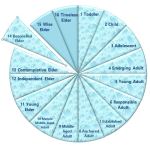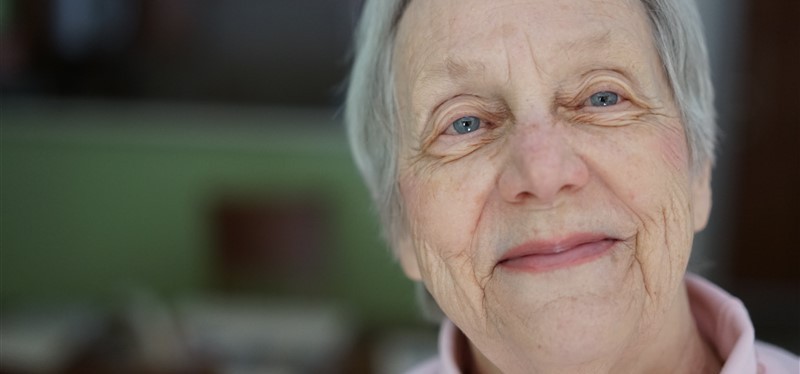 Average life expectancy of persons living in EU-28 countries was 80 years in 2013 (78 for men, 83 for women) and the number of persons reaching this age is growing. According to an Eurostat article “The graying of the baby boomers” the percentage of population aged 80 years and over in Europe in 2020 will be 5% compared to 1.7% in 1970.
Average life expectancy of persons living in EU-28 countries was 80 years in 2013 (78 for men, 83 for women) and the number of persons reaching this age is growing. According to an Eurostat article “The graying of the baby boomers” the percentage of population aged 80 years and over in Europe in 2020 will be 5% compared to 1.7% in 1970.
By this Blob, a majority of elders are quite dependent on others and require daily assistance. Activity is reduced and there is increased need of medical attention. It is easy to succumb to the feeling of losing control of life and there is tendency of emotional instability, such as depression or the feeling of loneliness. Still, if possible, most elderly people value their independence and prefer to continue to live in their own homes. In 2011, the proportion of elderly persons in the EU who were aged 65–84 years and living in a health care institutions or institutions for elderly persons was only 1.7 %.
 The relationship between health and mental health is the greatest. It becomes more and more important to have daily mental exercise (read newspaper instead of TV) and get mental stimulation. Those who keep active, e.g. through daily walks, don’t isolate themselves and keep the mind-body connection working. Men and women who walk at least half an hour every day cut their mortality rates in half compared with sedentary people of both sexes, according to a research performed in the Cooper Institute for Aerobics Research in Dallas. As Gail Sheehy states in her book “New Passages”: people with positive outlooks, who continue to connect themselves to the future and marshal their energies to defeat creeping depression are far more likely to extend their life positively.
The relationship between health and mental health is the greatest. It becomes more and more important to have daily mental exercise (read newspaper instead of TV) and get mental stimulation. Those who keep active, e.g. through daily walks, don’t isolate themselves and keep the mind-body connection working. Men and women who walk at least half an hour every day cut their mortality rates in half compared with sedentary people of both sexes, according to a research performed in the Cooper Institute for Aerobics Research in Dallas. As Gail Sheehy states in her book “New Passages”: people with positive outlooks, who continue to connect themselves to the future and marshal their energies to defeat creeping depression are far more likely to extend their life positively.
Successful or healthy ageing is an interdisciplinary concept, spanning both psychology and sociology. To support healthy ageing, “Activity theory”, as opposed to the “Disengagement Theory”, proposes that staying mentally and physically active increases the chances of successful ageing. Thus instead of withdrawing from society, as proposed by the Disengagement Theory, it promotes engaging in fulfilling work and to maintain social interactions with the motto: “the more you do, the better you age”. Building on the activity theory, “Continuity theory” states that older adults will usually maintain the same activities, behaviors, relationships as they did in their earlier years of life. Relationships and social roles providing the necessary support for maintaining a stable self-concept and lifestyle.
In the rich world, by the age of 80, cerebral blood flow is 20% less, as much as 30% of skeletal muscle are lost and renal blood flow is 50% less than at the age of 30. From the age of 80, 25% suffer from vision loss and 75% develop hearing problems.
Risk of developing Alzheimer increases with age, reaching 50 percent by the end of this Blob, making it the most common reason for the need of long-term care and accounting for the greater part of those in old age centers. Along with aging, many experts think that genes and lifestyle contribute to the majority of Alzheimer and Dementia cases. Surprisingly, according to research, when Alzheimer hits people in their 60s and 70s, they show faster rates of brain tissue loss and cognitive decline compared to patients 80 years and older.
 In his inspiring book “From Age-ing to Sage-ing: A Revolutionary Approach to Growing
In his inspiring book “From Age-ing to Sage-ing: A Revolutionary Approach to Growing
Older” Reb Zalman has some pragmatic advice: “The aging physical body is an automobile with a lot of mileage. We have to service it to maintain its longevity, and for this healthy diet and exercise help. Sometimes we have to take it in for a major overhaul, such as an operation. Yet with all our maintenance, we need to recognize that we’re the driver of the automobile, not the vehicle itself.”
Click here for Blob 15: Wise Elder
or read about any other Blob:
Spring: 1-6, 7-12, 13-18, 19-24
Summer: 25-30, 31-36, 37-42, 43-48
Autumn: 49-54, 55-60, 61-66, 67-72
Winter: 73-78, 79-84, 85-91, 91-…
Understand why the 7-year life stages are outdated in this Blog.
RESOURCES AND REFERENCES
From Age-ing to Sage-ing: A Revolutionary Approach to Growing Older by Reb Zalman
Your Guide to Health: Alzheimer’s: Reliable Information for Patients and Their Families by Maureen Dezell
Alzheimer’s hits harder earlier in life as people in their 60s decline more quickly than older patients in Mail Online
The greying of the baby boomers: A century-long view of ageing in European populations by Eurostat Statistics
New Passages: Mapping Your Life Across Time by Gail Sheehy
Activity theory (aging), Disengagement theory and Continuity theory from Wikipedia
Human Physiology/Development: birth through death from Wikibooks



It’s good to know that it’s not all doom and gloom, that something as simple as walking can be a real benefit. I’m not there yet, but my mother is in her late 70s and I worry about that. SHe was given a prescription from her doctor to join a gym – couldn’t believe that but all her minor ailments disappeared. We must look out for ourselves and families. Shared on Twitter too.
LikeLiked by 1 person
Thanks for sharing :). My mom is also in her mid 70s. Does simple exercises every day and goes for her daily walks. Keeping active not only does her body and mind good but also keeps her social life active as she meets up with others in her age for the walks. That’s what life is about, right? 🙂
LikeLiked by 1 person
Thanks for sharing. This is encouraging. My husband’s mother was one of 9 siblings, almost all of whom succumbed to Alzheimer’s in their 60s or 70s. My husband is now in this ‘blob” of age, yet is the picture of mental alertness and fitness. We both eat healthy meals, stay active and walk near the beach each day. Hopefully this will keep us on top of life! Decisions, Decisions, Decisions
LikeLiked by 1 person
Looks like you must be doing something right. Keep on doing whatever you are doing and take good care of each other :). Best wishes!
LikeLiked by 1 person
My father suffered from vascular dementia for over 14 years until he died aged 76 in February 2017 -he was finally diagnosed aged 62 – his dementia progress varied but in his last 3 years he went downhill at a rapid pace. Perhaps if he had succombed to the disease in his 80s instead of his early 60s then maybe, as your blogpost suggests, his brain cells wouldn’t have depleted as quick – but then again would he have lived as long to get to the final stages? Thought provoking indeed.
LikeLiked by 1 person
Sorry to read. 14 years is a long time to suffer. Wishing you strength to overcome the loss.
LikeLike